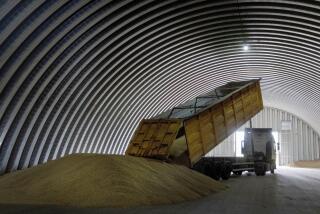3 Baltic States Form Alliance for Agriculture
- Share via
MOSCOW — The Soviet Union’s three Baltic republics, frustrated so far in their efforts to secede and re-establish their independence, Thursday took the first concrete step toward forming a united front to battle Moscow together.
Faced with the Kremlin’s three-week-old partial economic blockade of Lithuania and its threats of similar measures against Estonia and Latvia, the nationalist governments in the three republics created a common market in agricultural produce and in farming equipment and supplies.
Although part of a program for the economic integration of the three republics on the basis of market forces and private entrepreneurship rather than on central planning and state ownership, the move was immediately portrayed as a strengthening of their solidarity in the face of increasing pressure from Moscow.
Estonia urged Latvia and Lithuania to go further and revive the Council of Baltic States, which operated in the 1930s before World War II, to promote political coordination as well as economic integration.
Estonian President Arnold Ruutel invited President Vytautas Landsbergis of Lithuania and President Anatolijs Gorbunovs of Latvia to Tallinn, the Estonian capital, for weekend discussions on a coordinated strategy.
The Council of Baltic States, which would comprise the presidents, prime ministers and foreign ministers of the three republics, would attempt to work out joint but non-binding positions on a variety of issues, according to Estonian officials.
Lithuanian and Latvian officials said their governments are studying the Estonian proposal. The agricultural agreement, while originally part of a Kremlin-approved program of the decentralization and reform of the whole Soviet economy, took on a distinct political coloration as a result of Moscow’s efforts to squeeze Lithuania into submission through increasing economic pressure.
While Lithuania is largely self-sufficient in food, as are Latvia and Estonia, the creation of what is intended to become a regional free market is a significant step toward economic independence after 45 years of incorporation in the Soviet Union’s long-stagnant economy.
Each of the republics will have representatives in the others, according to the official Soviet news agency Tass, and they will “function as coordinators and assistants in joint efforts to resolve agricultural issues” as the three small states face increasing pressure from Moscow.
Official figures released Thursday by the Lithuanian government put the cost so far of Moscow’s sanctions at nearly $32 million; more than 23,000 people are unemployed as a result, the government added.
Soviet President Mikhail S. Gorbachev has demanded that Lithuania rescind its declaration of independence, or at least “freeze” its implementation, and negotiate its secession on the basis of the Soviet constitution and legislation.
When Lithuania refused, Gorbachev curtailed deliveries of oil, gas and other raw materials. He is now threatening to take similar action against Estonia and Latvia, although those republics decided on more cautious, step-by-step approaches to independence.
Algirdas Brazauskas, Lithuania’s deputy prime minister and the leader of its independent Communist Party, said he doubted whether Lithuania could hold out against the central government’s sanctions for more than four or five more weeks.
“More factories could close very quickly, and the government might face pressure from the people as the stranglehold tightens,” he said during a visit to Switzerland, where he was trying to gather support for Lithuania.
The Lithuanian government, continuing to loosen its ties with the Soviet Union, formally asserted its control of television and radio broadcasting in the republic Thursday. The Lithuanian Supreme Council, the republic’s Parliament, adopted legislation assuming responsibility for all broadcasting, which had always been under centralized control.
The new law requires radio and television to abide by Lithuanian rather than Soviet regulations and legislation, and to reflect the viewpoints of Lithuania’s residents.
In Paris, French President Francois Mitterrand met with Kazimiera Prunskiene, the Lithuanian prime minister, and renewed his call for negotiations to resolve the dispute.
“I see no other solution than the opening of a real dialogue and talks at an institutional level,” Mitterrand told her, according to Hubert Vedrine, his spokesman.
Mitterrand had jointly proposed with West German Chancellor Helmut Kohl that Lithuania suspend measures linked with its March declaration of independence in order to facilitate a dialogue with Moscow.
Although Lithuania offered to suspend some of the legislation, Landsbergis said the declaration of independence stood and would not be withdrawn or reconsidered. Gorbachev welcomed the Franco-German initiative, but has continued to insist that negotiations be carried out solely on the basis of the Soviet constitution and legislation.
“We will do everything in our power to avoid a deterioration of the situation,” Vedrine added, noting that Paris is in regular contact with Moscow about the crisis.
More to Read
Sign up for Essential California
The most important California stories and recommendations in your inbox every morning.
You may occasionally receive promotional content from the Los Angeles Times.













